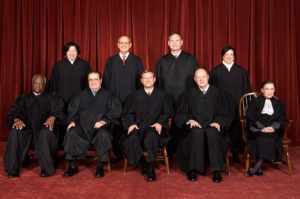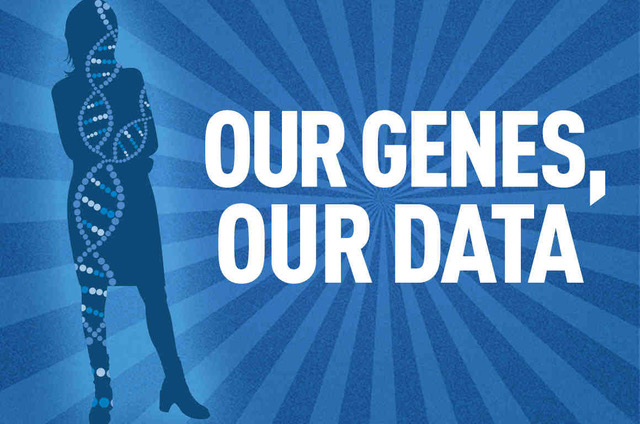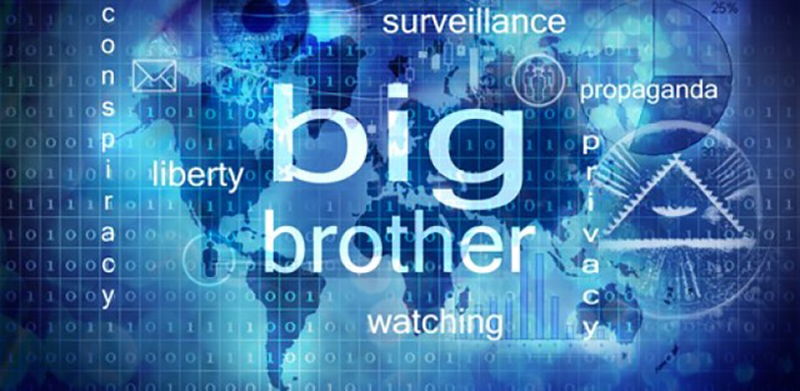Just when you thought it was safe to go back in the water…not so fast. The first shoe dropped when profit-making companies assailed our eardrums and our intellect to convince us that handing them our DNA for permanent inclusion on their DNA database was a dandy idea. We shredded that hokum in hijacking-your-dna-it-could-cost-you-your-freedom/. As we pointed out, the two most disastrous consequences of paying one of these outfits to “unlock the secrets of your DNA” — your DNA becomes permanently ensconced on their DNA database giving them co-ownership of what makes you tick and once you surrender your DNA, it might (without your permission or knowledge) be accessed by the long arm of the 17 intelligence agencies that undergird the surveillance state.
Now there’s a threat of a much higher order of magnitude. In a nation obsessed with eliminating personal privacy in the name of combatting crime and terrorism, the next logical step was a national DNA database. 9/11 became the excuse for massive intrusion into what was once considered private space. Welcome to the federal DNA database, NDIS (National DNA Index) part of CODIS (Combined DNA Index System), which gobbles up every bit of individual DNA it can beg, borrow or steal. As of 2016, according to the FBI, (which oversees NDIS), the NDIS contained over 13 million “offender” profiles, 3 million “arrestee” profiles and 684,000 “forensic” profiles for a grand total of almost 17 million DNA profiles (two years ago it had 15.48 million)— over 6% of the U.S. population over 18.

In 2013, the Supreme Court sided with the government as it has on numerous occasions, and gave its judicial blessing to what many legal scholars and civil rights lawyers consider an undemocratic and unconstitutional overreach. In Maryland v. King, a decision that got far less media attention than it deserved, the Court ruled that the police may collect DNA from people arrested in connection with “serious” crimes but not yet convicted of a crime. Serious, it turns out, boils down to whatever law enforcement wants it to be. In a country with a militarized police force whose motto “protect and serve” has taken a 180° to “shoot first and get acquitted later,” Orwellian scenarios are the most likely result.
What’s a prudent individual to do? For openers, don’t get arrested. Since the 2013 decision, DNA collection in one form or another after an arrest, is legal in virtually every state.  Think about it, if you are arrested in a demonstration against the empire’s wars or in a standoff at a gas pipeline (in some states a misdemeanor is all that’s required), the cops can force you to open your mouth for a cheek swab. Like the “No-Fly” list that you can’t get off (or even find out if you’re on it until you try to leave the country), there’s no sure way to remove your DNA from the NDIS— even if you are acquitted.
Think about it, if you are arrested in a demonstration against the empire’s wars or in a standoff at a gas pipeline (in some states a misdemeanor is all that’s required), the cops can force you to open your mouth for a cheek swab. Like the “No-Fly” list that you can’t get off (or even find out if you’re on it until you try to leave the country), there’s no sure way to remove your DNA from the NDIS— even if you are acquitted.
There’s more alarming news. Forget the old chestnut that in the U.S. privacy is an unquestioned value, protected by law, judicial precedent, custom and the fourth amendment (“the right of the people to be secure in their persons, houses, papers, and effects, against unreasonable searches and seizures shall not be violated…”). Alonzo King was arrested on suspicion of assault. His DNA was collected and it turned out to match the DNA of a rapist. He was subsequently convicted of that crime. Now we find ourselves on the horns of a dilemma— do we want to allow DNA to be collected even from people who have not yet been convicted of a crime on the chance it will unmask a rapist or murderer? Is the next step a government DNA database that scoops up the DNA of ever baby born in the U.S.? How menacing is the prospect of DNA untethered to any restrictions? Consider the records of the last several presidents, including the present one, all of whom have given a resounding yes to the primacy of surveillance over personal privacy. It didn’t take President Obama long after the King decision to sign a federal law setting aside $10 million per year for three years to assist states starting or expanding their DNA programs.
An additional and we assume unforeseen negative consequence of DNA collection after an arrest is its racial connotations. Already the present U.S. law enforcement climate is replete with examples of racial discrimination. It is a fact that African Americans are disproportionately vulnerable to being the objects of police investigations. A study conducted in 2013 after the King decision found that a black person using marijuana is four times more likely to be arrested than a white person and consequently more likely to be the victim of a DNA collection and wind up on the NDIS.
We have come to a crossroads: either our DNA is private information that should at all costs be kept that way or infringement on that most personal information is a legitimate trade-off to catch violent criminals and deter others. President Obama (AKA Mr. Hope and Change) used this rhetorical sleight of hand to excuse his sell-out to the security honchos — “You can’t have 100% security and also then have 100% privacy and zero inconvenience…There are trade-offs involved.” As the history of the Obama administration demonstrates, most of those trade-offs left the people on the short end of the stick.
The debate is not really about the Alonzo Kings of the world snagged in a DNA search. As a nation hooked on social media, accustomed to displaying ourselves warts and all on a multiplicity of venues, too few of us regard personal privacy as a must-have right in this wired world. How many would notice if they woke up one morning to discover that the notion of a personal right to privacy was as outdated as boom boxes and transistor radios? Many would agree with the government’s traditional weasel words: “I’ve got nothing to hide. If putting my DNA on a national DNA database will help catch criminals, I’m all for it.” Here’s the late Justice Scalia, a bedrock conservative, in an unprecedented move to the liberal minority — “Because of today’s decision [in King], your DNA can be taken and entered into a national database if you are ever arrested, rightly or wrongly, and for whatever reason…Solving crimes is a noble objective but it occupies a lower place…than the protection of our people from suspicionless law enforcement searches.”
![]()
Other critics of wide-spread DNA collection point to the propensity for “mission creep” as wide-spread data collection could ultimately be used to accumulate specific information on our medical history (susceptibility to certain diseases), trace our racial origins, assess our psychological make-up and draw other conclusions leading to our being tagged as a terrorist wannabee or even a potential serious offender.
Perhaps the most damaging aspect of King is that it pretty much closes the book on the second or third most important debate we should be having in the U.S. As Justice Scalia pointed out catching criminals may be a noteworthy objective in the abstract but how to balance that objective against its propensity to generate more wide-spread DNA testing and expand the parameters of an even more intrusive state surveillance apparatus? Is mandatory DNA testing of those not convicted of a crime the price a society of laws must pay to solve rapes, murders and other serious crimes? For most of us, the consequences of this decision will hit home if we are ever arrested and are forced to give up our DNA.
The late Justice Scalia may well be the canary in the coal mine when it comes to noxious Supreme Court decisions. Taking aim at a 1944 Supreme Court decision, Korematsu v. United States, that upheld the internment of over 120,000 Japanese Americans in concentration camps, Justice Scalia made a fateful prediction “You are kidding yourself if you think the same thing will not happen again…In times of war, the laws fall silent.” We would do well to remember that this is a “time of war,” in the U.S. — not one, but seven.
Justice Scalia’s dissent in King was equally prescient — “Make no mistake about it: because of today’s decision, your DNA can be taken and entered into a national database if you are ever arrested, rightly or wrongly…The proud men who wrote the charter of our liberties would not have been so eager to open their mouths for royal inspection.”
It’s a puzzle that should make for many sleepless nights —do we really inhabit a world so dangerous that rights, liberties and above all privacy are small things to sacrifice for the greater “good” of “keeping us safe?”
Believe that and I’ve got a bridge with your name on it.

769 total views, 1 views today

